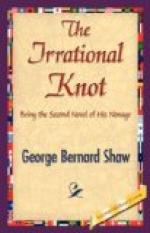When I say that I did and felt these things, I mean, of course, that the predecessor whose name I bear did and felt them. The I of to-day is (? am) cool towards Carmen; and Carmen, I regret to say, does not take the slightest interest in him (? me). And now enough of this juggling with past and present Shaws. The grammatical complications of being a first person and several extinct third persons at the same moment are so frightful that I must return to the ordinary misusage, and ask the reader to make the necessary corrections in his or her own mind.
This book is not wholly a compound of intuition and ignorance. Take for example the profession of my hero, an Irish-American electrical engineer. That was by no means a flight of fancy. For you must not suppose, because I am a man of letters, that I never tried to earn an honest living. I began trying to commit that sin against my nature when I was fifteen, and persevered, from youthful timidity and diffidence, until I was twenty-three. My last attempt was in 1879, when a company was formed in London to exploit an ingenious invention by Mr. Thomas Alva Edison—a much too ingenious invention as it proved, being nothing less than a telephone of such stentorian efficiency that it bellowed your most private communications all over the house instead of whispering them with some sort of discretion. This was not what the British stockbroker wanted; so the company was soon merged in the National Telephone Company, after making a place for itself in the history of literature, quite unintentionally, by providing me with a job. Whilst the Edison Telephone Company lasted, it crowded the basement of a huge pile of offices in Queen Victoria Street with American artificers. These deluded and romantic men gave me a glimpse of the skilled proletariat of the United States. They sang obsolete sentimental songs with genuine emotion; and their language was frightful even to an Irishman. They worked with a ferocious energy which was out of all proportion to the actual result achieved. Indomitably resolved to assert their republican manhood by taking no orders from a tall-hatted Englishman whose stiff politeness covered his conviction that they were, relatively to himself, inferior and common persons, they insisted on being slave-driven with genuine American oaths by a genuine free and equal American foreman. They utterly despised the artfully slow British workman who did as little for his wages as he possibly could; never hurried himself; and had a deep reverence for anyone whose pocket could be tapped by respectful behavior. Need I add that they were contemptuously wondered at by this same British workman as a parcel of outlandish adult boys, who sweated themselves for their employer’s benefit instead of looking after their own interests? They adored Mr. Edison as the greatest man of all time in every possible department of science, art and philosophy, and execrated Mr. Graham Bell, the




